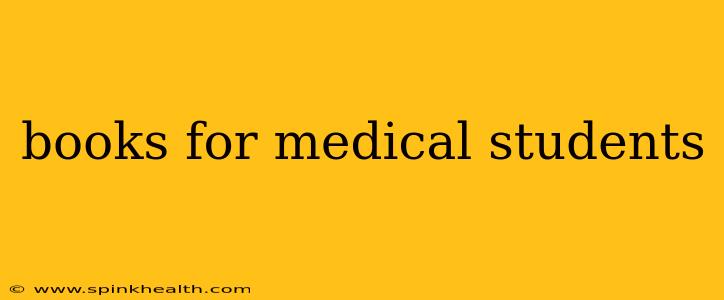The journey of a medical student is a marathon, not a sprint. It's a demanding path filled with late nights, countless hours of studying, and a constant stream of new information. Navigating this challenging terrain requires the right tools – and for medical students, that means having the right books. This isn't just about passing exams; it's about building a strong foundation for a successful and fulfilling medical career. This guide will take you on a journey through the essential texts, offering insights beyond simple book lists.
First-Year Foundations: Building the Blocks
The first year is all about laying the groundwork. Think of it as building the sturdy foundation upon which your entire medical education will rest. You'll encounter a vast range of subjects, from anatomy and physiology to biochemistry and histology. This is where comprehensive textbooks become invaluable.
What are the best anatomy textbooks for medical students?
This is a question many first-years grapple with. The answer often depends on your learning style. Some prefer detailed atlases with stunning visuals, while others prefer concise, text-heavy explanations. Many students find success with a combination of both. Consider exploring resources that offer both 3D models and traditional diagrams for a well-rounded approach. Remember, understanding anatomy isn't just about memorization; it's about visualizing the intricate relationships between different structures in the body.
What physiology books should I use?
Physiology is all about understanding how the body works. This requires a deep understanding of complex systems and their interactions. Finding a physiology textbook that balances depth with clarity is key. Look for texts with clear diagrams, helpful summaries, and clinical correlations to help you connect the dots between theory and practice. Engaging with real-world clinical examples will make the subject more relatable and memorable.
Beyond the Basics: Specialization and Clinical Application
As you progress, your studies will become more specialized. You'll delve into the intricacies of various medical disciplines. This is where specialized textbooks, clinical guides, and case studies become essential.
Are there specific textbooks for each medical specialty?
Absolutely! Each specialty has its own set of core textbooks, often considered the "bible" for that field. For example, cardiology students will find themselves relying heavily on specific cardiology texts, while neurology students will have their own go-to resources. The best way to find the most relevant texts for your specialty is to consult with upper-year students, residents, and your professors. They'll offer invaluable insights based on their experiences.
How can I find the best clinical practice books?
Clinical practice requires a different approach than rote memorization. Clinical books often focus on practical skills, diagnostic reasoning, and patient management. Look for texts that offer realistic case studies, step-by-step diagnostic algorithms, and clear explanations of clinical decision-making processes. These books will bridge the gap between theory and the real-world application of your knowledge.
The Unsung Heroes: Beyond the Textbooks
Let's not forget the power of supplementary resources. These aren't your primary textbooks, but they are invaluable tools that will enhance your learning experience.
What other resources are helpful for medical students besides textbooks?
Flashcards, online resources, review books, and even well-organized notes can make all the difference. Don't underestimate the value of a good study group, either! Collaborative learning can transform challenging concepts into manageable pieces. Remember that learning medicine is a journey of continuous exploration and discovery. Embrace the process, seek support, and you'll find success along the way.
This journey is more than just reading; it's about building your understanding, refining your skills, and forging a path towards becoming a compassionate and skilled physician. The right books are simply the tools that will help you on this incredible path.

